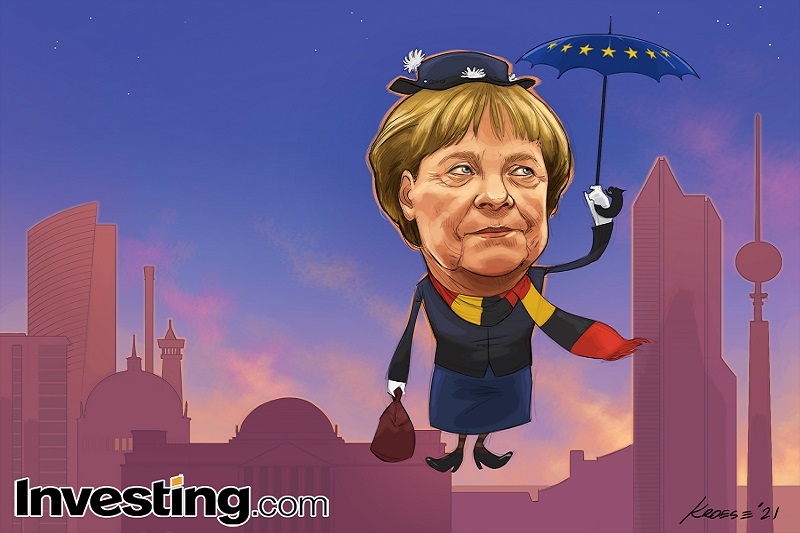By Geoffrey Smith
Investing.com -- The wind has changed and it is time for Europe’s Mary Poppins to depart.
She does so on her own terms, her approval ratings still sky-high after 16 years in power - a feat so rare in competitive democratic politics that it’s tempting to see her achievements as irrefutable proof of greatness.
That would be wrong, however. Her greatness amounts only to having ridden the outrageous good luck she had at the start of her career, and having defended as much as possible of the status quo that she inherited.
Merkel owed her big break in 2005 to the rash decision of her predecessor Gerhard Schroeder to call a snap election before the benefits of his labor market reforms could be felt. Merkel inherited all of their benefits in the form of lower unemployment and a much more efficient jobless insurance system, while Schroeder reaped all the rage of a traditional voter class that felt itself betrayed. The internal divisions that plagued the Social Democratic Party thereafter made it all-but unelectable, making it easy for her to occupy and monopolize the political center ground.
Once ensconced in power, Merkel time and again put German interests before European ones. In 2011, in the wake of the Fukushima disaster, she unilaterally accelerated the closure of Germany’s remaining nuclear reactors, to shore up her domestic political position against the Green Party. The consequences of that can be seen today: a fragile energy system with sky-high power prices, and a continued reliance on brown coal, the dirtiest of all fossil fuels, which inhibits both German and European policy on Climate Change.
As late as 2015, Merkel was personally lobbying U.S. regulators to certify Volkswagen’s dirty diesels as clean. By this stage, German pressure on EU institutions to cover up the health effects of diesel pollution had helped to create Europe’s largest health crisis – an estimated 500,000 people a year in the EU suffering shortened life expectancy due to air pollution, according to the estimates of the European Environment Bureau.
The influence of the German export lobby has led her repeatedly into actions that jeopardize Europe’s long-term security. She has soft-pedaled in relations with China and Russia, fearful of losing access to their markets. All that has earned is invasions of Ukraine and Georgia, the suppression of Hong Kong’s freedoms and rampant cyber-crime and espionage. She has indulged autocrats closer to home, too, refusing to adopt a harder line against the governments of Poland and Hungary despite their continued flaunting of the rule of law – supposedly a key European value.
Even the one occasion when Merkel showed true moral courage, in her approach to the migrant crisis of 2015, was a 23policy that had no regard for her European neighbors - neither the front-line states of Greece and Italy, nor the U.K., where her move played fatefully into the hands of a Brexit campaign that used it to exploit fears of uncontrolled migration.
To the extent that Merkel has ever acted in the broader interests of Europe, that is because they were impossible to separate from Germany’s narrower interests. Her biggest achievement - avoiding the collapse of the euro between 2010 and 2012 - was driven by the awareness that no-one had more to lose from such an outcome than Germany.
“Things can’t go well for Germany if they go badly for our neighbors,” was her mantra in the dark days between 2009 and 2012. (Typically, it was not an original one, but rather borrowed from Hans-Dietrich Genscher, the long-serving Foreign Minister of an earlier age.)
Her response to the euro crisis was a disaster for much of the continent: a straitjacket of austerity not just for southern Europe, but for Germany too, in the form of the ‘Schuldenbremse’, or ‘debt brake’. What followed was a decade of lost growth, characterised by hideously imbalanced economic policy: fiscal policy was too tight and had to be offset by a monetary policy that was too loose. Gains in wealth that could have accrued to wage earners accrued instead to the owners of assets, especially housing.
The imbalance is only now being addressed. Last year, faced with an economic emergency that balanced-budget doctrines could not cope with, Merkel broke her own taboo and threw her weight behind a plan that explicitly puts German taxpayers on the hook for large-scale European Union borrowing. Then, as ever, the Chancellor showed just enough flexibility to stop the status quo from breaking.
Sixteen years of that approach have kept the show (but whose show?) on the road. But they have stunted Europe’s digital and Climate Change policies, stopped it from addressing a dangerous power vacuum created by the U.S.’s withdrawal, and allowed nationalist authoritarianism to win a foothold on a continent where it has already done immeasurable damage.
Her successor will have to do better if Europe is to rise to its long-term challenges. But who among her potential successors will be able to resist copying her undeniable formula for success?
